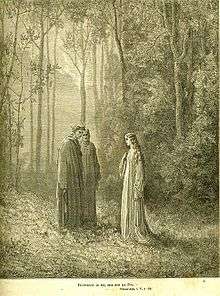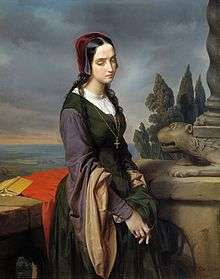Pia de' Tolomei


- For other meanings, see Pia de' Tolomei (disambiguation).
Pia de' Tolomei was an Italian noblewoman from Siena.
Biography

According to a tradition recorded by early commentators on Dante's Divine Comedy, she is to be identified with the 'Pia' mentioned in Canto V of Purgatory, where Dante and Virgil meet those were penitent at the time of their sudden violent deaths – her tale follows that of Bonconte da Montefeltro. She states that she came from Siena and was killed by her husband in the Maremma:
Do thou remember me who am the Pia;
Siena made me, unmade me Maremma;
He knoweth it, who had encircled first,
Espousing me, my finger with his gem.[lower-alpha 1]
She refers bitterly to her murderer for his disregard of his marital vows to her and briefly tells Dante her story. She asks the poet – once he has rested from his long journey – to remember her among the living and thus speed her journey through Purgatory. Dante uses the name 'la Pia' not 'Pia', underlining the familiarity between them. She also asks him to pray for her since she knows none of her family do so.
The identification of this 'Pia' with Pia de' Tolomei is now almost universally accepted, although conclusive documentary proof of this has yet to be found. Early commentators on the poem noted that she was to be identified with a woman of the Tolomei family in Siena, wife of Nello dei Pannocchieschi, lord of Castel di Pietra in Maremma, podestà of Volterra and Lucca, captain of the Guelph Taglia from 1284 and alive until at least 1322 (the year he made his will). There is also a surviving record of his second marriage, as a widower, to Margherita Aldobrandeschi, countess of Sovana and Pitigliano. They had one son, Binduccio or Bindoccio, who died aged thirteen when Orsini assassins, threw him down a well in Massa Marittima.
The surviving archives do not name Nello's first wife, but she has been identified with Pia. Nello owned Castel di Pietra in Maremma, where he is theorised to have murdered Pia in 1297, either after she found out about his affair with Aldobrandeschi or to clear the way for his second marriage. Among the early commentators Jacopo della Lana, l'Ottimo and Francesco di Bartolo assert that she may have been killed for some crime, whilst Benvenuto and the anonymous Florentine of the 14th century state it was due to her husband's jealousy. However, the Tolomei family had no daughters or nieces named Pia in Nello's time, though one male of the family did marry a woman named Pia Malavolti – the marriage did not last long (she had many lovers) and so the Tolomei decided to have Nello take her away to Maremma, where she died in misery, possibly murdered.
Another theory is that Pia was born a Malvoti and entered the Tolomei family by her marriage to Baldo d'Aldobrandino. According to this theory Pia was accused of adultery by her husband, then kidnapped by Nello and taken to Maremma, where she died.
In popular culture
Literature
- Novelle (prima parte, novella XII), collection by Matteo Bandello (1554)
- La Pia de' Tolomei: leggenda romantica, verse novella by Bartolomeo Sestini (1822)
- Pia de' Tolomei, tragedy by Carlo Marenco (1836)
- Pia de' Tolomei, popular poem by Giuseppe Moroni, known as il Niccheri (1873)
- Pia de' Tolomei, novel by Carolina Invernizio (1879)
- Pia de' Tolomei, short poem by Giuseppe Baldi (1889)
- Pia de' Tolomei. Romanzo storico, novel by Diana Da Lodi (1900)
- La leggenda della Pia, novel by Decimo Mori (1907)
- Dialogo della Palude by Marguerite Yourcenar (1930)
- Pia de' Tolomei. Composizione in ottava rima secondo la tradizione cantata, re-issue of the short poem by Giuseppe Moroni, known as il Niccheri, edited by Guglielmo Amerighi (1972)
- Pia de' Tolomei (racconto di vita e morte), play by Luca Rossi detto Lam (2003)
- Pia de' Tolomei e le "Notizie sulle Maremme toscane" , short poem by Bartolomeo Sestini, edited by Alessandro Bencistà, (2005)
- Matrimonio di sangue, novel by Mario Sica (2007)
- La Gemma di Siena by Marina Fiorato
Music
- Pia de' Tolomei, opera by Gaetano Donizetti and Salvadore Cammarano (1837), using the verse novella by Bartolomeo Sestini (1822)[1]
- La Pia, dalla Divina Commedia di Dante, melody by Antonino Palminteri (circa 1881)
- Dante's Prayer, song by Loreena McKennitt in the album The Book of Secrets (1997)
- ¿Pia? , one-act musical dialogue by Azio Corghi (libretto by Azio Corghi, freely adapting "Il dialogo della palude" by M. Yourcenar) (premiere 9 July 2004)
- La Divina Commedia, opera by Marco Frisina (2007)
- Pia come la canto io, concept album by Gianna Nannini (2007)
- La Pia de' Tolomei, rock opera by Gianna Nannini, libretto by Pia Pera (2010)
Cinema
- Pia de' Tolomei, directed by Gerolamo Lo Savio (1910)
- Pia de' Tolomei, directed by Esodo Pratelli (1941)
- Pia de' Tolomei, directed by Sergio Grieco (1958)
Notes
- ↑ Longfellow translation, Purgatorio, Canto V, lines 130–136.
References
- ↑ "Libretto di Pia de'Tolomei di Gaetano Donizetti" (PDF) (in Italian).
Sources
- Umberto Bosco e Giovanni Reggio, La Divina Commedia – Purgatorio, Le Monnier, 1988 (in Italian)
External links
- Bartolomeo Sestini, Pia de' Tolomei, Sonzogno, Milan, 1887; Borroni e Scotti, Milan, 1848 (in Italian)